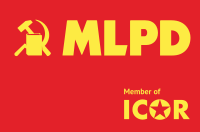Marxist–Leninist Party of Germany
Marxist-Leninist Party of Germany Marxistisch-Leninistische Partei Deutschlands | |
|---|---|
.svg.png) | |
| Leader | Gabi Fechtner |
| Founded | 1982 |
| Headquarters | Gelsenkirchen |
| Newspaper | Rote Fahne Magazin |
| Ideology | |
| Political position | Far-left |
| European affiliation | ICOR Europe |
| International affiliation | |
| European Parliament group | None |
| Colours | Red |
| Party flag | |
 | |
| Website | |
|
www | |
The Marxist–Leninist Party of Germany (German: Marxistisch–Leninistische Partei Deutschlands, MLPD) is an anti-revisionist Marxist–Leninist political party in Germany. It was founded in 1982 by members of the Communist Workers Union of Germany (Kommunistischer Arbeiterbund Deutschlands; KABD).
The MLPD advocates for the establishment of a dictatorship of the proletariat, overthrowing current capitalist relations of production and replacing them with a new social order of socialist orientation. It sees this as a transitional stage to the creation of a classless, communist society. In doing so, it refers to the theory and practice of Karl Marx, Friedrich Engels, Vladimir Lenin, Joseph Stalin and Mao Zedong. It rejects the terms "Stalinism" and "Maoism" as anti-communist fighting terms that divide the Marxist–Leninist movement. Whilst criticizing particular aspects of the political works of Stalin[1] and Mao,[2] MLPD openly defends those works,[3] standing in contrast to most left-wing groups in Germany.
It participates in the International Conference of Marxist–Leninist Parties and Organizations (ICMLPO) and the International Coordination of Revolutionary Parties and Organizations (ICOR). Representatives from the party have attended congresses of other communist parties around the world.[4]
The MLPD's youth movement is called REBELL (Rebel).
History
The MLPD has traditionally claimed to promote Marxism–Leninism and Mao Zedong Thought. Only part of the MLPD's membership originates from the 1960s students' movement. Willi Dickhut, the party's founder, had been expelled from the Communist Party of Germany in 1966 for criticizing the change of social conditions in the Soviet Union. His book on the restoration of capitalism in the Soviet Union was published in 1971 and is a fundamental part of the MLPD's ideology. The MLPD describes the political and economic changes in most of the Eastern European countries after the 20th Party Congress of the Communist Party of the Soviet Union as treason to socialism. From 1976, when the economic changes provided by Deng Xiaoping were taking place, MLPD's predecessor organizations criticized them as China's restoration of capitalism.
In the 1998 federal elections, the party gained only 0.01 percent of the votes. In 2002, the MLPD did not participate in the federal elections and called on people to boycott. The MLPD participated in the 2005 federal elections, generally positioning itself in campaigns as a radical alternative to the Left Party. The MLPD won 0.1 percent of the total votes cast. This marked a tenfold increase compared to the result of 1998, despite the competition with the Left Party. Its strongest showing was in the states of Saxony-Anhalt and Thuringia, where it garnered 0.4 percent of the vote.[5] MLPD also participated in 2009 federal elections and has announced its participation in the 2013 federal elections.
Still some trade unions in Germany have a policy of expelling members of the MLPD. An example of this is when the former chairman of the party, Stefan Engel, was forced to leave the IG Metall and became a member of Ver.di, which does not take a stance against the MLPD.
Famous former members of the MLPD
- Robert Kurz German marxist theorist
- Berthold Huber German unionist
Election results
Federal Parliament (Bundestag)
| Year | Erststimmen | Zweitstimmen | % of Zweitstimmen |
|---|---|---|---|
| 1987 | 596 | 13,422 | 0.0% |
| 1994 | 4,932 | 10,038 | 0.0% |
| 1998 | 7,208 | 4,731 | 0.0% |
| 2005 | 16,480 | 45,238 | 0.1% |
| 2009 | 17,512 | 29,261 | 0.1% |
| 2013 | 12,904 | 24,219 | 0.1% |
| 2017 | 35,835 | 29,928 | 0.1% |
European Parliament
| Year | Votes | % |
|---|---|---|
| 1989 | 10,134 | 0.0% |
| 2014 | 18,198 | 0.1% |
References
- ↑ MLPD homepage Archived 2014-02-22 at the Wayback Machine. (German)
- ↑ MLPD homepage (German)
- ↑ "Socialist Equality Party receives over 15,000 votes in German elections". 21 September 2005. Retrieved 19 August 2013.
- ↑ "Indian communists confidently chart way forward". 12 November 1997. Retrieved 19 August 2013.
- ↑ http://www16.dw-world.de/wahlgrafik/index.php?lang=en Archived 2006-10-06 at the Wayback Machine.